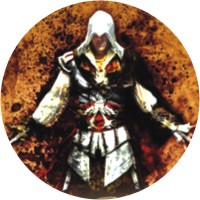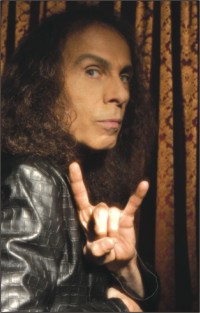Second Time's the Charm
By Emil

Assassin's Creed I was one of the hyped games of the Xbox. And it was by far one of the most disappointing AAA games to be released by Ubisoft, or any other AAA companies. Fumbling combat, repetitive gameplay, unrealistic elements such as landing in a stack of hay from fifty feet above, and all that just made the game somewhat blehful. Yes, I just made that up. Apparently, there was also some controversy regarding Jade Raymond, producer of AC. But I wouldn't really know about that.
Anywho. Ubisoft promised improvements- or if they didn't, it was damn well implied- to the sequel to AC. It was said they learnt from their mistakes, and had made changes and improvements to most aspects of the game. Aside from the DRM of course. That just sucked.
Assassin's Creed II starts with Desmond escaping with the help of Lucy, who is a total kickass, it seems, which we always like. You're introduced to the combat system, and soon enough, you find yourself safe and sound in a place, which we are assuming to be secret. Lucy and co. also seem to possess an Animus machine of their own. Animus 2.0. So, what's the deal? Desmond is to be turned into an Assassin, with the help of the improved Animus, which integrates skills and talents from the genetic memory (in this case, from Ezio Auditore da Firenze back in Renaissance) directly onto the specimen (in this case, Desmond). Radical.
Graphics: What used to be known as the Scimitar engine has been renamed to Anvil, with improvements made primarily for ACII. Smoother flowing graphics, somewhat better lightning and nicer humanoid models are all pretty nifty. Ah, but, what's eye-catching visuals to awesome gameplay anyway, right?
Gameplay: There's been an almost-complete overhaul of the gaming mechanism. Ezio can swim, for one. Arabian English-accented Altair was not much of a swimmer. One assumes it's due to the lack of abundant bodies of water in the desert. The combat system is much more complex and, in turn, much more fun than the previous game. Additional swords and other armaments are purchasable from blacksmiths, including armour. Thanks to the genius mind of Leonardo da Vinci, friend of the Firenzes, Ezio is able to add new weapons and upgrades to his arsenal. Eagle vision is now more specific to people and places. Ubisoft has tried to make this a fun and engaging game by implementing incentive-based elements. On the most part, they've succeeded.
 That still does not justify falling into stacks of hay and dried leaves. Come on. Seriously, guys?
That still does not justify falling into stacks of hay and dried leaves. Come on. Seriously, guys?
Story: A story of love and betrayal, of honour and intrigue, lies and deceit (yeah, this just sounds cool), Assassin's Creed II promises to unfold the ongoing conspiracy from the previous game. Ezio is forced to take up his father's legacy when his family is framed and betrayed by the Pazzis, and he will learn that everything is not what it seems to be.
That is, in fact, the essential gist of the game.
Conclusion: Ten, nay, at least twenty times better than the first game, Assassin's Creed II has done much to redeem for its past mistake. However, one can't help but feel like an unwilling guinea pig as part of their experiment with the first game, where Ubisoft just wanted to see what the masses wanted or didn't. Also, the fact that one STILL has to run away after every assassination is kinda blergh. Can one NOT pull off ONE kill without being chased by a gang of angry gorillas in armour? Well, at least, one can swim now.
All that said, ACII still has done a marvellous job to shine a better light on the franchise and on Ubisoft. The AC series has managed to paint a brighter future for itself thanks to this, not exactly awesome, but still pretty darned good title. Someone lacking a good game to play for some time will find ACII to be the perfect one to get back into the… well, the game.
Music Review
Holy : A Tribute
: A Tribute
By Musarrat Rahman
“cancer, I'll kick the hell outta you!” said the heavy metal purist on March of this year but unfortunately stomach cancer has finally brought this legend down. 
Ronnie James Dio, the pint-sized heavy metal musician, whose soaring vocals, poetic lyrics and mythic tales of a never-ending struggle between good and evil broke new ground in heavy metal, died Sunday the 16th of May, according to a statement from his heartbroken wife, Wendy Dio. He was 67.
Dio was best known for fronting Black Sabbath after the departure of Ozzy Osbourne, but he was also involved in the bands Elf, Rainbow, Heaven & Hell and Dio during a career stretching over 53 years.
He rose to fame in 1975 as the lead singer of fantasy-themed heavy metal band Rainbow, the band founded by ex-Deep Purple guitarist Ritchie Blackmore.
Dio then replaced legendary vocalist Ozzy Osbourne in Black Sabbath circa 1980 and released the critically acclaimed album 'Heaven And Hell', which is considered by many critics to be one of the finest heavy metal albums of all time. His on-again, off-again relationship with Black Sabbath started an intense debate among fans as to which singer, Ozzy or Dio, was the true essence of the band a discussion that lasted until his death.
He also enjoyed a successful solo career with his self-titled band, Dio, which he did in between his three stints with Black Sabbath (1980-1982, 1992 and 2007-2009).
Like other influential rockers, Dio also organised an all-star charity collaboration in 1986 called 'Hear N' Aid' to raise money for famine relief in Africa.
Many of his most memorable songs were around the struggle between good and evil, including his signature track 'Heaven And Hell'. He also drew inspiration from medieval imagery in songs like 'Neon Knights', 'Killing The Dragon' and 'Stargazer'.
Thinking of making a 'Tribute to Dio' playlist for your iPod? A few of his other famous tunes include 'Hungry for Heaven', 'The Last in Line', 'Long Live Rock n' Roll', 'The Mob Rules', 'Man on the Silver Mountain', 'Rainbow in the Dark' and 'Holy Diver'.
Or, You can also watch the first 15 minutes of Tenacious D: Pick of Destiny to pay your respects.
 “He possessed one of the greatest voices in all of heavy metal, and had a heart to match it," said Twisted Sister guitarist Jay Jay French, whose band toured with Dio since 1983, and was scheduled to do so again this summer at European rock festivals. "He was the nicest, classiest person you would ever want to meet."
“He possessed one of the greatest voices in all of heavy metal, and had a heart to match it," said Twisted Sister guitarist Jay Jay French, whose band toured with Dio since 1983, and was scheduled to do so again this summer at European rock festivals. "He was the nicest, classiest person you would ever want to meet."
More than 7,500 fans posted tributes to the singer on his official Facebook fan page within an hour of his death being announced while his celeb friends took to Twitter to send out respects to the rock god. "Horns at half-mast. Such a huge loss," tweets Scott Ian, rhythm guitarist with metal group Anthrax while Sebastian Bach comments “Crying right now in remembrance of my hero and friend,”. Famed Metallica drummer Lars Ulrich even posted a very emotional open letter to his idol, "Ronnie, your voice impacted and empowered me, your music inspired and influenced me, and your kindness touched and moved me. Thank you.”
While Dio is most famous for his roles in both Rainbow and Black Sabbath, not many people know that Ronnie James Dio is also responsible for popularising the 'devil horns' metal sign that every band in Dhaka is so obsessed with. Let's all salute Ronnie James with the devil's horns as we say goodbye and thank you.
Headed for the big rock stage in the sky, may Ronnie James Dio rest in peace.
